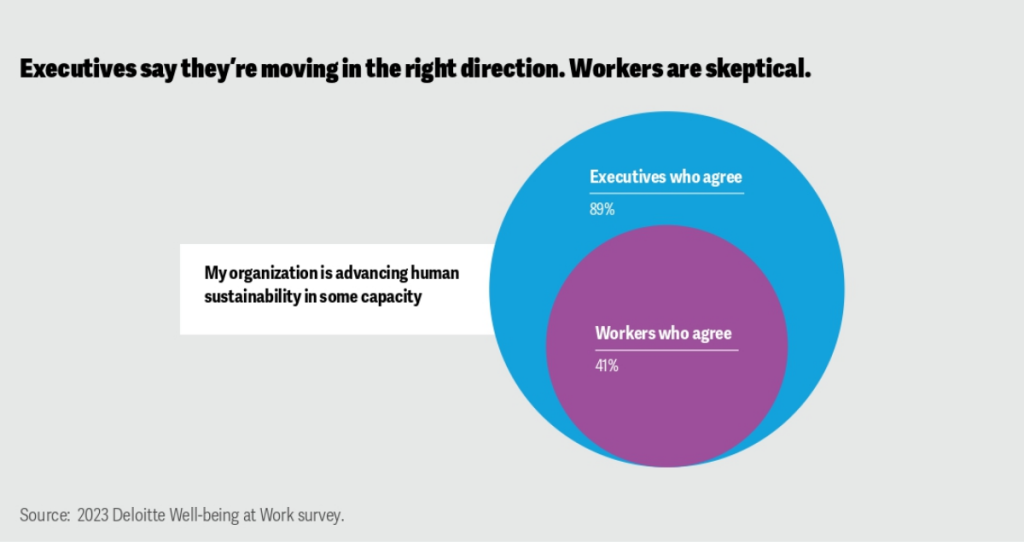
TAKEAWAYS
Deloitte’s 2024 edition of its annual Global Human Capital Trends report, Thriving Beyond Boundaries: Human Performance in a Boundaryless World, identifies seven trends that showcase how a combination of business and human outcomes plays a role in organisational success, which include human sustainability and trust. This year’s analysis reveals that organisations making meaningful progress on these key issues are nearly twice as likely to achieve desired business and human outcomes.
“As technology and cultural shifts reshape work and the workplace, it’s our human capabilities and outcomes that remain at the heart of growth and innovation. Leaders, many of whom are already aware of this, should now turn this understanding into actionable strategies. This latest Global Human Capital Trends research can serve as a roadmap for organisations to dismantle silos and traditional constructs and move towards collaborating with their workforce to enhance human performance,” said Dan Helfrich, Chair and Chief Executive Officer, Deloitte Consulting LLP.
Prioritising human sustainability – the degree to which an organisation creates value for people as human beings, leaving them with greater wellbeing, employability, and providing opportunities for advancement – can drive better outcomes for humans and businesses in a mutually reinforcing cycle. The more workers feel like their organisations are priorisiting their welfare and the stronger sense of belonging that they cultivate, the better their performance at work becomes. Yet, Deloitte’s report finds that there is a perception gap between executives and employees in terms of how their organisations are creating value for workers.

“Within Southeast Asia, leaders recognise that prioritising human sustainability isn’t separate from business success, it’s integral to it. Empowering employees to thrive isn’t a tradeoff with business outcomes, it’s a pathway to enhancing them. By prioritising employee wellbeing, organisations unlock productivity, innovation, and resilience, ensuring sustainable success,” said Indranil Roy, Workforce Transformation Leader, Deloitte Southeast Asia.
Given the current dynamic of work, with its cross-functional and less quantifiable nature, traditional productivity metrics like hours worked and time spent on tasks may no longer be an adequate measure of employee performance. Advancements in technology and data collection practices can enable organisations to gather more meaningful metrics to measure performance. As the amount of employee data increases, with sources ranging from common workplace tools such as email and calendars to emerging tools such as wearable devices, organisations have to consider how transparent they ought to be with their workers.
“With advances in technology, there is ample opportunity for organisations to tap on the power of data to measure employee performance, but they need to do so with purpose and transparency. Leaders need to move from measurement for measurement’s sake to indepth analyses of performance. For this to work, they also need to earn their employees’ buy-in by effectively communicating the reasons behind data collection and establishing robust practices for privacy and data integrity,” said Mark Maclean, HR Transformation Leader, Deloitte Southeast Asia.
This year’s research also includes several trends that focus on how organisations can evolve their mindsets and approaches to meet new challenges. One of the challenges highlighted is the rapid advancement of artificial intelligence (AI) and generative AI, which is putting a spotlight on the importance of workers honing their enduring human capabilities like curiosity, to spark their imagination, and empathy, to understand customer needs.

“Collaboration between humans and technology is a new frontier for work. Leading organisations exploring this interplay are encouraging their workers’ creativity and curiosity. By empowering employees to experiment with new tools and allowing them to explore how these technologies can be additive to their work, we can drive better business outcomes faster. This dynamic will propel businesses and their people into a tech-enabled future,” said Ramona Yan, Asia Pacific Human Capital Leader and Partner, Deloitte Consulting (Shanghai) Co. Ltd.
Apart from having the opportunities and tools to experiment, today’s workers also want the freedom to build microcultures tailored to each of their team’s needs, while still staying true to broad organisational values. To support these more autonomous and diverse teams, HR will need to build “people expertise” capability throughout the organisation, so that knowing and understanding how to develop, motivate and deploy workers for optimal performance becomes a responsibility and capability of everyone within the organisation.

“The conventional one-size-fits-all approach has become obsolete in meeting the diverse needs of today’s workforce. Leaders should embrace the concept of local microcultures, as the unique culture of an employee’s immediate workgroup or team has a direct and powerful impact on their work experience. Organisations should acknowledge and honour the distinct requirements of each team, all while upholding an overarching set of core organisational values,” said Mark Teoh, Human Capital Leader, Deloitte Southeast Asia.
The speed at which the future of work is evolving will likely continue to accelerate. While Deloitte’s research shows that many organisations have yet to make the mindset and operational shifts needed to respond to this, there is room for optimism. Most organisations are aware of the steps that need to be taken, and they now have a window of opportunity to do so.
Deloitte’s 2024 Human Capital Trends report is based on a survey which polled 14,000 business and human resources leaders across various industries and sectors in 95 countries. In addition to the broad global survey, Deloitte supplemented its research this year with worker- and executive-specific surveys to represent the workforce perspective and uncover gaps between leader perception and worker realities. The survey data is complemented by over a dozen interviews with executives from some of today’s leading organisations.
The full report is available here.
This article was contributed by Deloitte Southeast Asia.